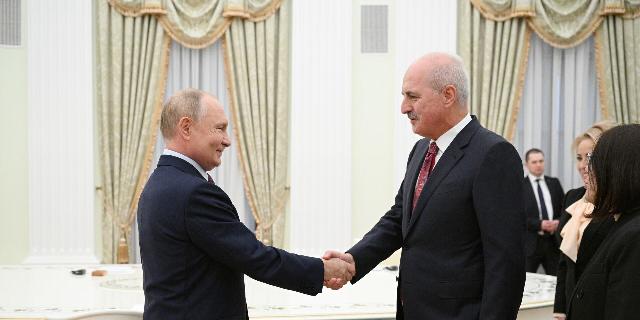Sabah: Turkey has outlined its position on Russia and the West
The speaker of the Turkish parliament, Numan Kurtulmus, shared his impressions of the meeting with Vladimir Putin, Sabah writes. Turkey intends to continue to adhere to multipolarity, cooperating with two centers at once: East and West. However, the issue with NATO is still open.
Mahmut Ovur (Mahmut Övür)
We are in Moscow together with the Speaker of our Parliament, Numan Kurtulmuş, and the parliamentary delegation. The last meeting within the framework of the visit program, which everyone was looking forward to, took place with the President of Russia, Vladimir Putin. And this was probably one of the most interesting moments of the trip. The talks were both a preliminary preparation for Erdogan's long-awaited meeting with Putin, and an indicator of how much importance Russia attaches to Turkey as a political partner.
We asked Numan Kurtulmush about this meeting on the plane on the way to St. Petersburg.
Turkey's role in the Ukrainian events
"Mr. Putin highly values relations with Turkey. He has a very close friendship and sincere interaction with our president. He also appreciates Turkey's mediation in ending the military conflict [in Ukraine]. We discussed regional and global issues. A very productive conversation was held on the Palestinian issue with almost complete agreement of positions. I openly outlined what concerns us, and he openly shared his ideas. We have once again seen that President Putin attaches great importance to Turkey."
Be in two centers at the same time
"It wasn't planned in advance, but as a result, a signal was given. It just so happened. Turkey is a country that can talk to any country, region of the world, build relations in the field of foreign policy, and talk openly about all problems. It was one of the specific indicators."
A common signal for East and West
The speaker of the Turkish parliament, referring to President Erdogan's speech at the UN, noted: "Our esteemed president said at the UN General Assembly, 'Israeli aggression must be stopped,' but we said the same thing here. In other words, Turkey does not say one thing in America and another in Russia. Wherever in the world we speak out, we strive to intelligently and clearly convey Turkey's position to our interlocutors."
The question that interested the Russians
During his visit to Moscow, Numan Kurtulmus also visited the Diplomatic Academy of the Russian Ministry of Foreign Affairs. This is a landmark place, as a significant part of Russian political figures grew up here, including the current Russian Foreign Minister Sergei Lavrov. Moreover, it is a center that has been visited by the world's leading leaders. The speaker addressed students and teachers here, answering questions about Turkey and regional events.
While the students were more interested in Turkey's views on regional wars and Israeli atrocities in Palestine, the teachers focused on Turkey's relations with the West. The most striking issue in this regard was about NATO membership. One of the teachers asked bluntly: "Will Turkey withdraw from NATO?"
Numan Kurtulmus gave the same direct answer: "From now on, we are entering a period of development of multilateral relations in all regions of the world. Turkey is a country that has maintained close relations with the West for many years. Turkey is a member of NATO. We have been on the path to joining the European Union for many years and are faced with various double standards from Western countries. But Turkey, although it faces the West, is by nature an eastern country. Turkey has never closed its doors to the East, has never turned its back on it and will not turn back. Therefore, we will continue to maintain multilateral relations and in the future, due to our national nature, we will maintain relations with centers of power in different parts of the world."

